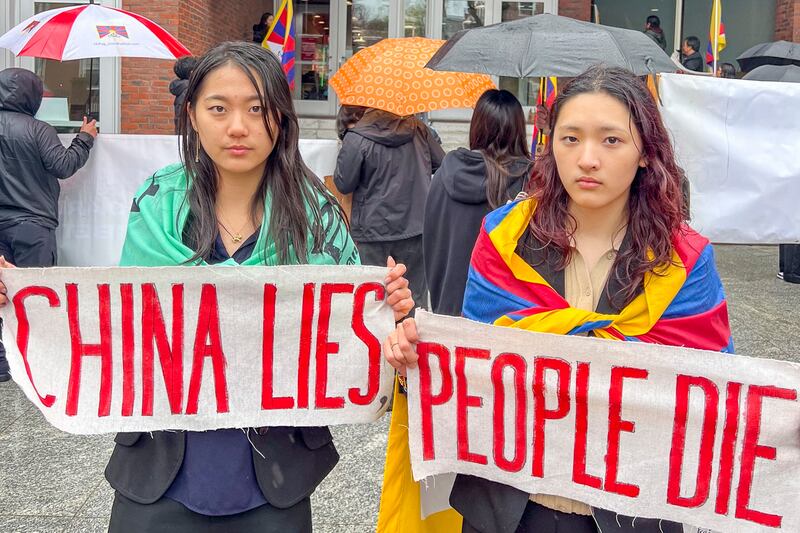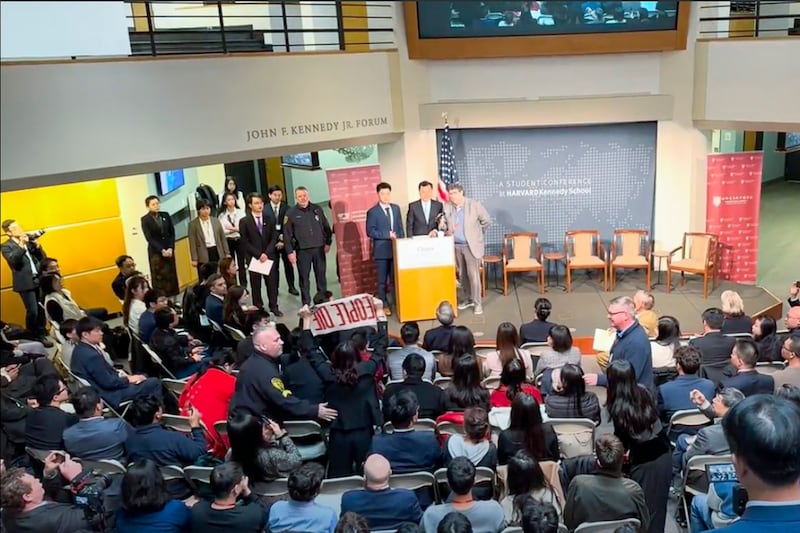A protester who loudly disrupted a speech at Harvard by Chinese Ambassador Xie Feng on the eve of a visit by Secretary of State Antony Blinken to China said she did it to discourage world-class universities from "kowtowing to China" despite committing human rights abuses.
Harvard junior Cosette Wu, who grew up in Hawaii with Taiwanese parents, stood up with a banner that read "China Lies" during Xie's speech to the Kennedy School of Government on Sunday, shouting loudly about the ruling Chinese Communist Party's political crackdown in Hong Kong and its threat to invade democratic Taiwan.
As Xie was speaking, Wu stood up suddenly and yelled: "Xie Feng, you paint an image of a prosperous China, but your hands are painted with blood!"
"You've robbed Hong Kongers of their most fundamental freedoms and devastated their democracy. Now in my country Taiwan, you sought to do the same!" she shouted.
She was then dragged to one side by an unidentified man in a blue shirt, who twisted her arm and handed her over to a uniformed security guard in the corridor outside, according to video footage of the incident.
Xie's speech was delayed by around 45 minutes by the incident, which included several other shouted protests in support of Tibetans and Uyghurs, as well as a gathering of more than 30 people with banners outside the venue.
Wu told RFA Mandarin that she wanted to take issue with the Chinese Communist Party's "unbridled abuse of human rights" and warn world-class universities like Harvard not to be taken in by its propaganda.
"Beijing has managed to win over the leadership of world-class universities with funding," Wu said. "It's shocking how many professors kowtow to the Chinese Communist Party and sing its praises."
Hong Kong crackdown
She said she also wanted to hold Xie publicly responsible for his role in suppressing Hong Kong's promised freedoms.
"Xie Feng served as the Chinese Communist Party’s special commissioner in Hong Kong during the promulgation of the National Security Law," Wu said. "This person was responsible for supervising Hong Kong."
"He has [also] made unabashed and blatant threats to invade Taiwan," she said, adding that Xie "is in direct contradiction to the values of Harvard."

After Wu was dragged out of the room, a second protester stood up, holding up the "Snow Lion" flag of the Free Tibet movement.
"Free Tibet!" the man shouted. "How can you be here when the Chinese government is in direct contravention of every human rights law in the world?"
"You are a representative of a government that advocates for genocide," the man shouted. "The genocide of the Tibetan people, of the Uyghur people, the occupation of Hong Kong."
"You are a travesty," he shouted, leaving the room and continuing to shout from the corridor. "You do not deserve to be here. This is a free country. Shame on you, Xie Feng!"
Subject to disciplinary action
During the diatribe, Xie paused, apparently wondering when someone would deal with the man.
Then an organizer warned participants that the event was being held to encourage "fruitful discussion,” adding that anyone who disrupted the event again would be subject to “disciplinary action.”

Liu Pengyu, a spokesperson for the Chinese Embassy in Washington, condemned the protest in a statement to The Harvard Crimson newspaper.
“Facts cannot be distorted. The farce put up by anti-China forces to discredit China and undermine China-U.S. relations is doomed to failure,” Liu told the paper.
A spokesperson for protest organizers Students for a Free Tibet, told RFA Tibetan that they wanted to interrupt Xie in spreading Chinese propaganda.
"China's political propaganda strategy is to repeat lies about Tibet, Taiwan, Hong Kong and East Turkestan," the spokesperson said, using the name many use to denote the Uyghur homeland in what is currently the Xinjiang Uyghur Autonomous Region of China.

"They tell these lies loudly and frequently at the United Nations and even on the Harvard campus," they said. "So our goal was to make sure the Chinese Communist Party didn't have another opportunity to repeat those lies enough times until [people thought they were] facts."
Earlier this month, University of Seville journalism professor Mar Llera was part of a two-person protest against the opening of one of China's Confucius Institutes at the school, saying the language and cultural institutions pose a threat to freedom of speech and academic activity on campus.
A 2019 U.S. Senate subcommittee report found that the institutes could constitute a threat to university life and freedom of speech in the United States., as their funding comes "with strings attached," while politicians in the U.K. have called for a review of the institutes' presence on British university campuses.
Security, not human rights
The protests targeting Xie came on the eve of Blinken's China trip, although analysts didn't foresee it would prompt greater discussion of China's rights record during the visit.
"I doubt Blinken will raise the Harvard incident in his meetings," Michael Cunningham, Research Fellow at the Heritage Foundation's Asian Studies Center, told RFA Mandarin. "But the issues the protesters raised, such as Hong Kong, Taiwan, Tibet and Xinjiang, will probably be on his agenda."
He said human rights weren't the main focus of Blinken's trip.
"His main focus will be issues related to security, such as China's support for Russia and tensions in the South China Sea and Taiwan Strait, as well as US-China tensions over issues like technology and trade," he said in a written comment to RFA Mandarin.

Lily McElwee, deputy director and fellow in the Freeman Chair in China Studies at the Center for Strategic and International Studies, agreed.
"Human rights concerns are for the most part, always raised in official visits and dialogues by American officials to China and with Chinese counterparts," she said. "But I also should note that there will be a lot of other topics on the table for Blinken to raise when he goes to China."
"Taiwan is one, technology is a big one, [also] South China Sea issues."
She said the issue of overcapacity recently raised by Treasury Secretary Janet Yellen during her visit to China was also still on the agenda.
Translated by Luisetta Mudie. Edited by Malcolm Foster.

